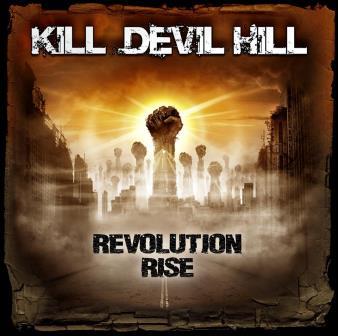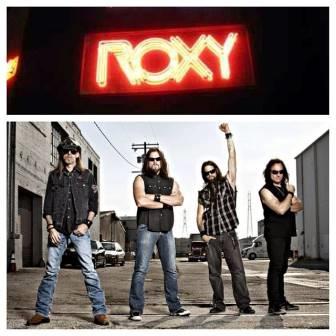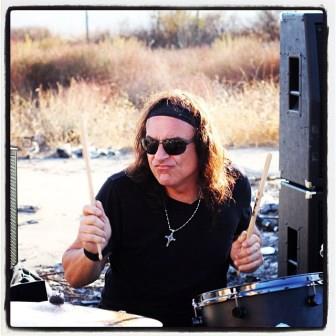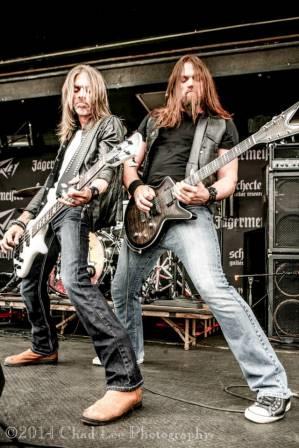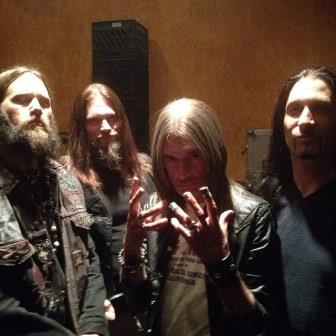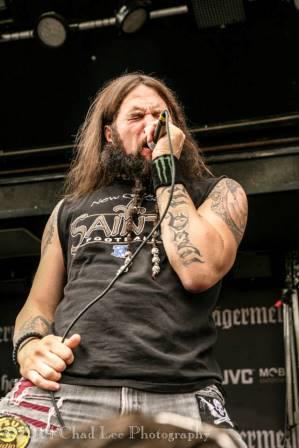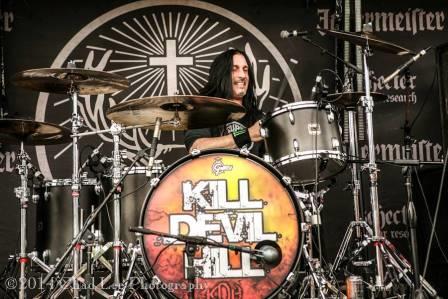
| |||||
|
|
What makes a band resonate with chaotic hardcore underage delinquents? What makes songs flow freely as players bounce around ideas fed by the energy in the room? How does a band form with structure, tone, pacing and dynamics needed to make rock’n’roll? How do they know the riffs they incorporate or the speed and power will work for an expansive market of jaded critics and audiences? How does a musician get past the “get together phase and blow the place up” to the intention of music as a career? And once a musician plays with the likes of Black Sabbath, Pantera, Ratt, John Lennon, Type O Negative, Danzig, Pissing Razors already addicted to the instant rush, his ass being lifted into the air as if by magic from the fans, how can he start again, with new players, new music and the uncertainty?
Can he go back to humping his own gear into a club and sleeping in a crowded bus or on a friend’s floor or getting so loaded he wakes up on an unfamiliar esplanade where Nirvana was once found? In truth, what started out as a jam between former drummer Vinny Appice (Black Sabbath, Dio, Heaven & Hell, Big Noize), Johnny Kelly (Type O Negative) since taking Appice’s place in KDH, and guitar slinger Mark Zavon (Ratt, W.A.S.P., Pearcy’s Rat Bastards, Mandy Lion and WWIII) to drum tracks Appice had already laid down began an evolution of the band Kill Devil Hill.
This was the call to start again, only the next round would be up against hip hop instead of punk rockers turned grunge.
Whereas other bands just dwell on the fuck-ups, these seasoned pros already know how to fix them. Kill Devil Hill is as good as metal gets.
“A mutual friend told me that Vinny was looking for a guitarist, and that he had given him my number,” Zavon says. “Before Vinny could call me I ran into him backstage at a show, and we decided to get together and jam. As it turned out he lived right down the street from me, and in L.A. that is pretty uncommon.” Over the next few months, they wrote seven songs.
They needed a singer.
Zavon told Appice Dewey Bragg (formerly Pissing Razors) would be the perfect fit.”I was sitting and recording and wondering what I was doing with myself when Mark called and asked if I wanted to try out,” says Bragg. “So when I walked into Vinny’s house and saw the gold records, I said, ‘oh crap’. I realized who he was.”
“I heard bassist Rex Brown (Pantera) was looking for something. We had done the Black Sabbath/ Pantera shows so I called him. He still had the same number,” Appice says.
“In twenty minutes I knew this was it,” Brown says of the combination that would become Kill Devil Hill.
“To hear that bass was awesome,” says Bragg. “I grew up on Pantera.”
“It was like winning the lottery,” Zavon says of the band.
And the founder? “It started out as an inkling of an idea. Then when I heard us playing, I thought damn, this is special. It’s a real band,” Appice says.
And don’t think punk rock didn’t cross-over to the genre of heavy metal or the other way around. Musicians like Metallica and Motorhead emerged styles with the Ramones. Brown says in his 2013 book Official Truth, 101 Proof “around 1989, music was really changing. It seemed there was this whole different brand of music appearing on the horizon that’s been labeled Alternative: the first Jane’s Addiction, the live one; Faith No More; Voivod; and Soundgarden; all these kind of bands who put out crushing records. So we (Pantera) absorbed these influences along with what we’d taken from what Metallica had done and created our own thing.”
Musicians always embrace the music be it punk, grunge, or metal. “They are all firmly rooted in rock’n’roll. It’s easy to point out differences between the styles you mentioned, but they are all artistic extensions of the rebellious spirit that was born back in the fifties,” Zavon says.
“Subgenres, genres boil them all down, dude, they are pure unadulterated fucking rock’n’roll straight up,” Brown says in a Horns Up Rock interview.
And what about metal that makes it resonate with its fans? “Everybody’s got their own point of view, but generally speaking,” says Zavon, “I think the aggressive energy of metal has a certain appeal that connects with fans in a way that some other genres can’t.”
Kill Devil Hill and its current line-up of Rex Brown, Mark Zavon, Dewey Bragg and Johnny Kelly, all seasoned pros, know how to handle the uncertainty of creating an embryo. Zavon explains, “You just have to take it one day at a time. If you are fortunate enough to be in a situation with really talented guys who are also great people to hang out with, then the details sort themselves out. I feel lucky to be able to count myself in this category.”
And what about latest member Johnny Kelly from Type O Negative when Appice went to do other projects? “Getting Johnny in the band, it’s like a shot gun blast. Been friends forever; now we get to play together,” says Brown.
KDH toured Australia and Europe recently. They found the scale bigger in Europe, but the fans were a lot like the fans in the US, really excited to see the band. “The logistics are a little different in Europe, and there is a much bigger audience due to marketing and promotion that doesn’t necessarily happen here in the states, but the fans have been amazing no matter where we’ve played,” Zavon says.
Self-titled Kill Devil Hill CD and latest Revolution Rise hits with a thunderous sound and indelible melodies embodied within the amazing raw power to which Brown says, “Love of music brought Kill Devil Hill together. If you’ve been playing a long time, you kinda know where it’s going.”
Their communication is effortless.
The music rocks and judging from the audience, all agog and aglow, that last explanation seems to fit these pioneers.
|
|
|
